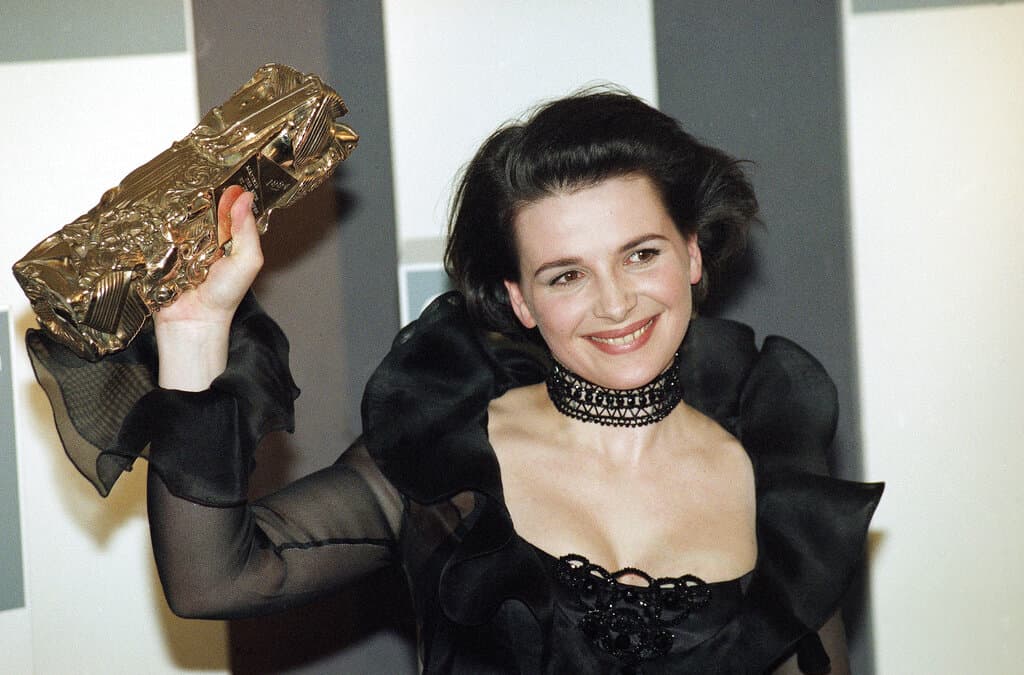Juliette Binoche Retrospective Focuses on Her Award-Winning Roles
With an actress as prolific as Binoche, a whole tract could be written on those movies not included in the Quad’s humble survey.

‘Beautiful Binoche’
The Quad Cinema
August 5-10
In 1997, Juliette Binoche won an Oscar in the Best Supporting Actress category for “The English Patient,” in which the French actress plays a World War II nurse named Hana who tends to a badly burned “English patient” (Ralph Fiennes) in a dilapidated, damaged Italian villa. While there, she falls for a Sikh bomb defuser (Naveen Andrews) as the final months of the European arena of the war drag on.
Ms. Binoche gives a sensitive, luminous performance in all her scenes, yet what I remember most is the moment the character cuts her own hair rather unceremoniously by a window. Like a bold Vermeer painting or a radical Da Vinci portrait in motion, the scene exudes quiet verve and an unpredictable naturalism that’s in keeping with Ms. Bichoche’s beauty and body of work.
The Quad Cinema’s upcoming “Beautiful Binoche” retrospective includes “The English Patient” as well as other movies for which the actress won plaudits, such as Krzysztof Kieślowski’s “Blue.” In that 1993 film, she plays a young woman who learns to live again after the death of her daughter and composer husband, with whom she co-wrote, but took no credit for, musical scores. For her performance, Ms. Binoche won the Best Actress awards at the Venice Film Festival and the César Awards, and it is one of her most beloved.
Also included in the series is one of her first international breakout roles: as charmingly earnest Tereza in “The Unbearable Lightness of Being.” One can say that she steals the movie from Daniel Day-Lewis, and most cinephiles would agree. Another early picture, Louis Malle’s “Damage,” features Ms. Binoche’s Anna in a torrid affair with her fiancé’s father, played by Jeremy Irons, and once again, the actress surpasses her co-star in terms of emotional range.
Those two films are both in English, and one wishes that some of her early, French triumphs appeared on the roster, movies like André Téchiné’s “Rendez-vous” or Leos Carax’s “Bad Blood” or “The Lovers on the Bridge.” With an actress as prolific as Ms. Binoche, though, a whole tract could be written on those movies not included in the Quad’s humble survey.
With such an illustrious career, Ms. Binoche has had the privilege of working with some of the best European directors around (and vice versa). She has even teamed up with some of these directors more than once, such as with Olivier Assayas and Michael Haneke. Both directors are represented, via screenings of “The Clouds of Sils Maria” and “Caché” respectively. While I believe she is more impressive in Assayas’s “Non-Fiction” and Haneke’s “Code Unknown,” her willingness to work with such cerebral — at times even pretentious — directors proves her commitment to a cinema of ideas.
Intellectual concerns aside, one quality that stands out in many of the movies in which Ms. Binoche has starred is her willingness to explore sexuality and sensual physicality. The most recent example of her oeuvre in the Quad’s series is 2017’s “Let the Sunshine In,” and this gem of a movie reflects the the star’s continued erotic openness as an actress. Beginning with a lovemaking scene, the film tracks the affairs of a divorced artist as she dates and breaks up with various cads.
Director Claire Denis draws out a sultry, heartbreaking, exuberantly romantic essence from the now middle-aged actress, and it’s a wondrous sight. (It wasn’t the last time Ms. Denis elicited a great performance from the actress.)
Rounding out the retrospective’s roster is Abbas Kiarostami’s “Certified Copy.” In the film, Mr. Binoche plays a French antiques dealer living in Italy who goes on a quasi-date/art-appreciation excursion with a British writer. After being mistaken for a married couple, the two fast-forward to a strained relationship, enacting a delicate dance of play acting and honesty amongst throngs of other couples and Tuscan charm. The movie’s inconclusive discussions and meandering rhythm may not be for everyone, but there’s no denying that Ms. Binoche provides viewers with yet another fascinating, emotionally mutable portrait of a woman searching for meaning. Also, it won her the Best Actress award at Cannes. Certified indeed.

